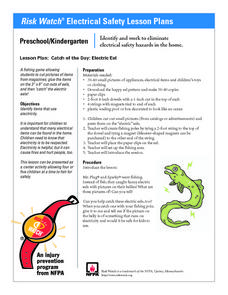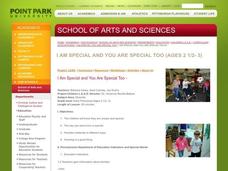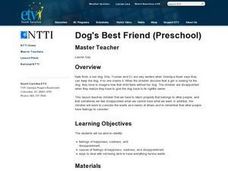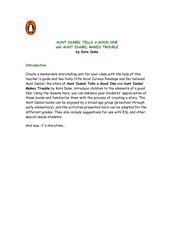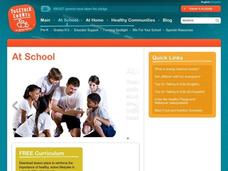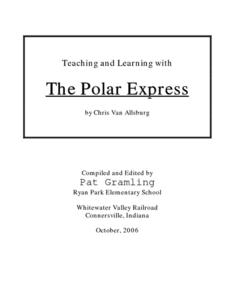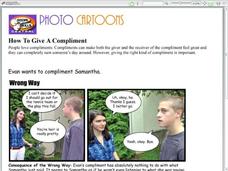Curated OER
Where Does Food Come From?
Distinguish between food and non-food items. Recognize that food is obtained from both plant and animal sources. Identify sources for some common animal foods then construct a simple food path from the farm to the consumer.
Curated OER
Video Lesson
Hats off to Barry for a great idea. He teaches Adapted PE to elementary school children, and when he is absent they often don't get to have PE. So he came up with this great plan to videotape short lessons that his pupils could follow,...
Curated OER
Lesson Plan: ABC's of Electricity
Students are able to identifty items that use electricity. They identify 10 household items that run on electricity. Students understand and articulate that electricity is to be respected. Electricity is helpful, but it also can cause...
Curated OER
Catch of the Day: Electric Eel
Students identify and work to eliminate electrical safety hazards in the home. They identify items that use electricity. Students use a fishing game that allows students to cut pictures of items from magazine; glue the items on the 3" x...
Curated OER
Compound Words: Worksheet 3
Young writers create compound words by matching a word in column one to a word in column two. They create a list of written words they have formed. Students will create 20 words on this one-page worksheet. An answer key is included.
Curated OER
Learning Colors and Shapes
Help your class learn shapes and colors with this worksheet! Learners follow given directions and color each of 20 shapes the listed color. There are 6 different shapes for youngsters to identify and color. Very nice worksheet for young...
Curated OER
Read to Us!
Kids love being read to. Use these children's books and accompanying activities to engage young learners. Fun drawing print-outs and charts are included, and a variety of reading strategies are employed.
Curated OER
A House for Hermit Crab
Make predictions and recall details while reading A House For Hermit Crab. While you read the story, discuss aspects of the plot and encourage listeners to respond. Extension activities such as crafts, counting, puppets, and...
Curated OER
I Am Special and You Are Special Too
Pre-schoolers identify things that make them a special individual. In this diversity lesson, they read the book Little Gorilla and discuss ways they are special and unique. Children create a birthday party for "Little Gorilla" and...
Curated OER
Dog's Best Friend
Students learn about and identify feelings of happiness, sadness and disappointment. In this feelings lesson, students have a show and tell time about their pets and discuss how it would feel if they lost their pet. Students watch a...
Curated OER
Aunt Isabel Tells a Good One...
Explore language arts by reading two similar stories in order to compare and contrast them in class. Young readers read two Aunt Isabel books, by Kate Duke, and discuss the main characters, plot, and setting. They complete a graphic...
Curated OER
If you Give a Mouse a Cookie
Switch things up with rendition of If you Give a Mouse a Cookie. Students should enjoy reading this story on the projector screen, or on their own computer in the lab. This PowerPoint includes 17 slides, filled with large text and...
Curated OER
Physical Activity and Energy
Does smiling take as much energy as running a lap around the track? Everything the body does requires energy. The more vigorous the activity, the more energy the body requires to perform the activity. Compare different low-energy...
Whitewater Valley Railroad
Teaching and Learning with The Polar Express
Use a series of extension activities to enhance your class reading of Chris Van Allsburg's holiday classic, The Polar Express. From a biography of the author to filmed book reviews and research about the railroad, kids can take...
PreKinders
Five Green Speckled Frogs Pocket Chart
A cute set of pocket chart pieces can help you sing about "Five Green Speckled Frogs." The resource includes lyric strips for the song, as well as five frogs (one is eating a most delicious bug), a log, and numbers one through five.
Math Solutions
Shape Sorting: Looking for Green!
Young mathematicians rotate, flip, and sort their way to an understanding of the different attributes of geometric figures. Using transparent yellow and blue shapes, children try to match congruent figures together...
Visa
Credit Cards
Choosing your first credit card can often be an intimidating and confusing experience for young adults. Give your pupils the foundational knowledge they need for tackling this process head-on, including learning to...
Visa
Making Spending Decisions
By role playing real-world experiences, such as purchasing snacks and grocery/toy store shopping, your youngsters will begin to develop an understanding of how to make decisions and choose between alternatives. This is the first...
Visa
Earning Money
Where does money come from? Is it limitless and always available? Introduce your youngsters to the concept of earning through jobs and/or chores with a matching activity and provided worksheets.
Social Skills Central
Photo Cartoons: How To Give A Compliment
Help learners develop the ability to offer appropriate, meaningful compliments to others—an essential social skill. Here you'll find a quick photo cartoon illustrating a right and wrong way to give a compliment, as well as a brief...
PBS
Heart to Heart
Study heart health and math in one activity. After measuring their resting heart rates by finding the pulse in their wrists, learners build a stethoscope to listen to their heart rate, and note the differences between the two methods.
Practical Money Skills
Making Decisions
A set of quizzes and assessments would make a great companion to your instructional activity on making decisions and opportunity risks. Learners watch a PowerPoint before answering multiple choice questions about interest rates, saving...
Street Law
Mock Trial - Shawn Wright v. Play and Learn Childcare Center
A child breaks his arm while at daycare. Was the staff negligent? That is the question at the heart of the mock trial case, Shawn Wright v. Plan and Learn Childcare Center.
Western Illinois University
Activities for Supporting Oral Language Development
Support young scholars' oral language development with the use of four early childhood activities. To reinforce proficiency, pupils read with an adult, play a game of telephone with their peers, put on a play with puppets or stuffed...
Other popular searches
- Preschool Lessons
- Preschool Five Senses
- Preschool Dinosaurs
- Preschool Dramatic Play
- Preschool Community Helpers
- Preschool Colors
- Preschool Baby Animals
- Free Preschool Dinosaurs
- Circus Theme Preschool
- Preschool and Winter Sports
- Outer Space Preschool
- Healthy Eating Preschool



